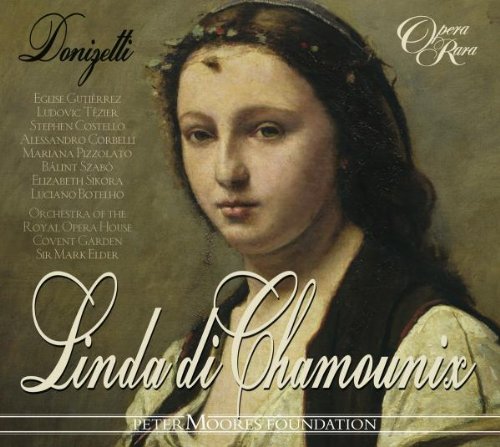Donizetti Linda Chamounix
Elder stabilises Donizetti's volatile heroine
View record and artist detailsRecord and Artist Details
Composer or Director: Gaetano Donizetti
Genre:
Opera
Label: Opera Rara
Magazine Review Date: 8/2011
Media Format: CD or Download
Media Runtime: 0
Mastering:
Stereo
DDD
Catalogue Number: ORC43

Tracks:
| Composition | Artist Credit |
|---|---|
| Linda di Chamounix |
Gaetano Donizetti, Composer
Alessandro Corbelli, Marquis de Boisfleury, Baritone Bálint Szabó, Prefect, Bass Eglise Gutiérrez, Linda, Soprano Elizabeth Sikora, Maddelena, Soprano Elizabeth Sikora, Maddalena, Soprano Gaetano Donizetti, Composer Luciano Botelho, Intendant, Tenor Ludovic Tézier, Antonio, Baritone Marianna Pizzolato, Pierotto, Mezzo soprano Mark Elder, Conductor Royal Opera House Chorus, Covent Garden Royal Opera House Orchestra, Covent Garden Stephen Costello, Carlo, Tenor |
Author: Richard Lawrence
The opera is a melodramma semiserio; there’s a buffo bass and a mad scene for the soprano, but the bass is not wholly comic and the soprano recovers without dying. The story is hard to take seriously. Linda, sent to Paris to escape the attentions of the lecherous Marchese, loses her wits on receiving a double blow: she is abandoned by her beloved Carlo and cursed by her father. She is brought back to Chamonix by her faithful friend, Pierotto, and only regains her sanity when Carlo repeats the words and music of the Act 1 love duet. The score, however, is a powerful one. Donizetti makes use of reminiscence motifs to good effect: from the love duet and, even more tellingly, from Pierotto’s ballad about a girl who leaves home and ignores her mother’s sound advice. And there’s some splendid patter for the Marchese, in the manner of Rossini’s Doctor Bartolo.
Mark Elder’s conducting is punchy and delicate by turns, the chorus and orchestra responding to his vigilant control of dynamics. The sound is good, except where members of the chorus are given little solos. The two leads are not quite top drawer. Eglise Gutiérrez’s tone has an occluded quality in places and Stephen Costello is full-throated rather than graceful. The best performance comes from Alessandro Corbelli, in a part that could have been written for him. Ludovic Tézier spins a beautiful, proto-Verdian line as Linda’s father and Bálint Szabó is his equal as the Prefect.
The recording includes an extended version of the mad scene. The booklet is exemplary. For greater clarity, though, it would help if Opera Rara put unset passages of the libretto in italics rather than between inverted commas. Taken as a whole, the performance does the composer proud.
Discover the world's largest classical music catalogue with Presto Music.

Gramophone Digital Club
- Digital Edition
- Digital Archive
- Reviews Database
- Full website access
From £8.75 / month
Subscribe
Gramophone Full Club
- Print Edition
- Digital Edition
- Digital Archive
- Reviews Database
- Full website access
From £11.00 / month
Subscribe
If you are a library, university or other organisation that would be interested in an institutional subscription to Gramophone please click here for further information.




